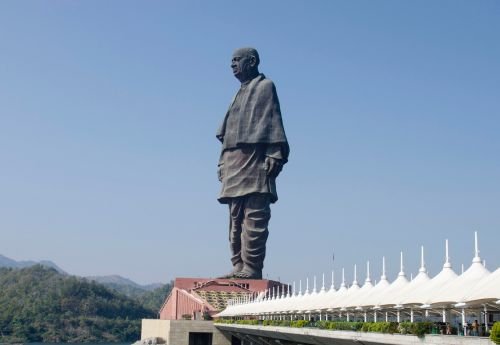The Iron Man Of India: Sardar Vallabhbhai Patel

Sardar Vallabhbhai Patel was born on October 31, 1875, in Nadiad, Kheda district of Gujarat. He is known to be an Indian independence nationalist. He was the first Deputy Prime Minister of India from 1947 to 1950 and acted as the Home Minister in 1947. He also played a significant role in the country’s struggle for independence and its political integration.
When Sardar met Mahatma
Patel’s life experienced a major change when he met Mahatma Gandhi. The charismatic figure that he is today, was led by a long series of actions. He was a prominent barrister and at a successful position in his career when he met Mahatma Gandhi. He was playing bridge at the Gujarat Club when he had the opportunity to meet Mahatma Gandhi for the first time.
Listening to the ideology of Gandhi, he scoffed over his methods of satyagraha and ahimsa. Although Patel mocked Gandhi’s ideas, he also had thoughts as to why such outstanding scholars were joining him. Watching people with distinguished intellect join the mahatma, his mind started to change and within 2 years of them meeting, Patel became a lifelong follower of Gandhi. Patel became one of those who took this life changing decision to give up their thriving careers to serve the nation. In 1917, for the first time, Patel had a direct interaction with Mahatma Gandhi in the Gujarat Political Conference in Godhra. After that meeting, Patel, on Gandhi’s suggestion, was made the secretary of the Gujarat Sabha’s executive committee.
Bardoli Satyagraha
In 1928, the British started demanding unjust taxes from the farmers in Bardoli, there was a 30% tax hike and the farmers did not have enough property and crops to pay the tax, let alone feed themselves and their families.
Patel led this national movement called the “bardoli satyagraha”, where he demanded the tax rate be reduced. He also conducted multiple ‘no-tax campaigns’.
Patel successfully resolved the farmers’ conflict and after this movement, Gandhi gave Patel the title of ‘Sardar’.
Patel’s election as President of Congress
In 1930, Gandhi declared the Dandi march, also called the salt satyagraha, and Patel planned everything from the start to the very end of the march.
The Sardar planned the Mahatma’s route.
The Britishers were so scared of Patel that even before Gandhi announced the dandi march, the Britishers arrested Patel to scare and discourage Gandhi. Patel was sent to jail for three months, the Sabarmati Central Jail and a fine was imposed on him.
Patel became so well known in the eyes of the local public that Pandit Moti Lal Nehru suggested his name to Mahatma Gandhi to make him president of the Congress.
Patel had just come out of jail, and the public was filled with deep resentment after the execution of Bhagat Singh, Sukhdeo and Rajguru, which happened in 1931. There was anger, helplessness, no trust and the urge of violence.
At such a difficult time, Patel was elected as President of Congress for the Karachi session in 1931 after the Gandhi-Irwin pact. Patel gave a short speech in his usual style, straight from the heart. The speech had the expected impact on people, it brought back the trust which people had lost in the nation. After his election as president of congress, he turned his mentor’s words, “Be the change that you wish to see in the world.”, into reality.
Patel advocated for many social issues including the establishment of a secular nation, minimum wages for workers, abolition of untouchability and caste discrimination, reducing alcohol consumption and for the freedom of women. He also endorsed returning the confiscated land back to the farmers in Gujarat.

Quit India Movement
The Quit India Movement, also called the ‘Bharat chhodo andolan’, was started by Gandhi in 1942 to bring the British rule to an end and to ensure India’s independence.
Although some leaders in the Congress did not agree with the proposal, Patel stood still on his conviction that a rebellion of such intensity would incite the people of the country and the British would be forced to leave under pressure. It was after Gandhi’s urge for the quit india movement resolution to pass, the All India Congress Committee approved of it.
Patel, on 7th August 1942, spoke to a crowd of over 100,000 people gathered at Gowalia Tank in Bombay. He appealed to the masses to participate in the big movement, refuse to pay taxes and shut down all civil services. After this huge step, Patel was arrested and imprisoned with the entire Congress Committee from 1942 to 1945 at the fort of Ahmednagar.
Sardar was released in 1945 and due to the intensity of the Quit India movement, the British decided to transfer power to the Congress and leave India.
Iron man of India
Right when India gained independence in 1947, there was violence along the borders and Patel provided relief to the refugees who had eluded from Pakistan and were crawling into Delhi and Punjab. He worked vigorously towards maintaining peace.
Apart from that, approximately 565 self-governing princely states were not willing to be a part of India because they were under direct rule of the British. Patel, along with Nehru and Menon, convinced these princely states to assent to it.
The dedication in Patel’s heart to integrate the country was commendable and his commitment led to him earning the title of, “Iron man of India”.
Sardar Vallabhbhai Patel had an exceptional contribution in the independence of India. All other congressmen and the local public had immense trust in him and they believed that Patel would always keep his country first.
He was appointed as the first deputy Prime minister and the home minister of India in the newly formed government of Prime minister Jawaharlal Nehru. He played a major role in the making of policies regarding the nation’s security and administration.
More Blogs

Learning has never been so exciting!
Ignite your curiosity and love for learning through our interactive and tailored learning plans. Our online courses are designed to cater to individuals of all ages and background, offering personalized learning paths, flexible scheduling and progress tracking. Enroll now and feel the difference !
Sardar Vallabhbhai Patel is known as the Iron Man of India for his contributions in unification of India.
Sardar Vallabhbhai Patel is known as the iron man of India. The reason is that his commitment to national integration in the newly independent country was total and uncompromising, earning him the title ‘Iron Man of India’.
Sardar Vallabhbhai Patel (31st October, 1875 – 15th December, 1950) Vallabhbhai Jhaverbhai Patel was born in Nadiad, Gujarat on 31 October, 1875. He was popularly known as Sardar Patel.
An extraordinary leader, freedom fighter and architect of the integration of India, Sardar Vallabhbhai Patel, better known as “Iron Man of India,” remains an enduring icon of patriotism, nationalism and the spirit of public service.
Sardar Vallabhbhai Patel is known as the Iron Man of India for his contributions in unification of India.
The correct answer is Sardar Vallabhbhai Patel. Sardar Vallabhbhai Patel has been an important contributor to the consolidation of India. He included many small and big princely states in India
Sardar Vallabhbhai Patel was tasked with the monumental mission of political integration in India, and he is in responsible of uniting the country’s 562 princely states.




